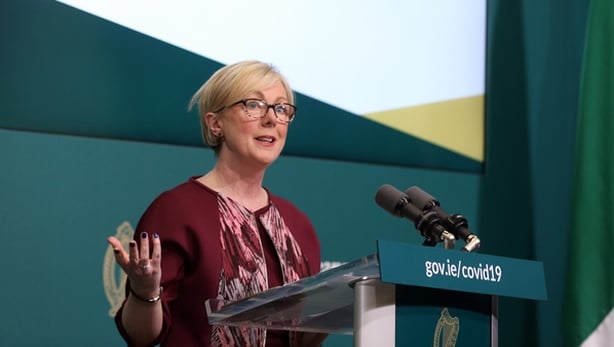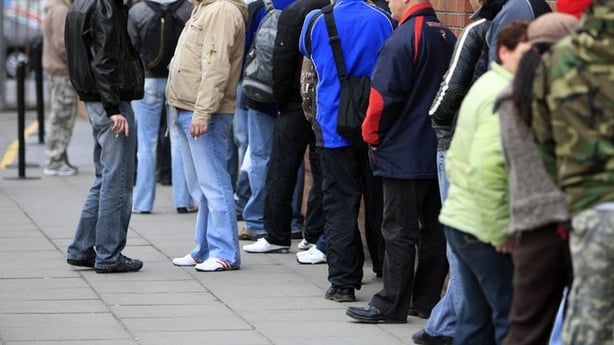More than half a million people were receiving some form of social welfare income support by the end of March, according to the latest Live Register figures from the Central Statistics Office.
The CSO said that 283,037 people were receiving the €350 weekly Covid-19 Pandemic Unemployment Payment, introduced on 16 March.
This was on top of the seasonally adjusted Live Register total of 207,200, which was up 24,400 on the February figure.
In addition, 25,104 people were benefiting from the Government's Temporary Covid-19 Wage Subsidy Scheme that allows struggling employers to ask the State to pay 70% of workers' wages.
This brings to 513,350 the number of people claiming jobless benefits or wage subsidies, a fifth of the labour force.
A delayed estimate of the unemployment rate, which stood at 4.8% in February, is due to be published next week.
We need your consent to load this rte-player contentWe use rte-player to manage extra content that can set cookies on your device and collect data about your activity. Please review their details and accept them to load the content.Manage Preferences
The CSO said today that the Covid-19 crisis has had a significant impact on the labour market during March.
It said the Government's emergency payments are not captured in the traditional methodology of the Live Register, which is a historical series that captures the number of claimants for Jobseeker's Benefit or Jobseeker's Assistance.
It also said that Covid-19 payments are currently viewed as short-term in nature, with an expectation that after 12 weeks those in receipt of such payments may return to work or may be considered for other jobless benefits.
"As it would not be statistically beneficial or valid to break the current Live Register series to try and capture these temporary measures, it has been decided to compile the March 2020 data in the traditional way and provide separate details of COVID-19 payments," the CSO added.

Minister for Employment Affairs and Social Protection Regina Doherty has described the latest Live Register figures as a "stark reminder" of how much has changed in the space of a few weeks.
She noted that when the last Live Register figures were published in February, they recorded a further fall in numbers, and with an unemployment rate of 4.8%, there was still talk about technically being at full employment.
"The Covid-19 emergency has completely upended that narrative," the minister said.
"The crucial challenge for the Government is that we don't let what is is a temporary health emergency become a permanent economic crisis."
The Minister said the measures introduced by the Government "at breakneck speed", including the Covid-19 Pandemic Unemployment Support Payment, the enhanced Covid-19 Illness Benefit, the Temporary Wage Subsidy Scheme and the extension of the fuel allowance for an extra four weeks, were providing immediate relief.
Ms Doherty also said the new measures had shown that the country can rise to significant challenges.
She noted that the department is continuing to process as quickly as possible more claims from income support arising from temporary lay-offs arising from the further health measures announced last Friday.
Ms Doherty said first and foremost the country was facing a health emergency and the highest priority had to be the protection of public health and human life, but that the income supports introduced were crucial to alleviating the financial hardship so many were now facing.
She said they would also play an important role in sustaining incomes and positioning the economy for what she hoped would be a fast recovery.
The minister commended employers who had availed of the Temporary Wage Subsidy Scheme, adding that maintaining the link between the employer and employee would be crucial "to reboot businesses as soon as possible so that people can start going back to work quickly".

During the financial crisis a decade ago, which hit here especially hard, it took three years for jobless claims to reach a peak of around 450,000.
Just three weeks were needed this time for the two forms of jobless claimants to top that.
Analysts say the April numbers will be even worse as construction sites, gyms, hairdressers, DIY stores and other retailers only fully shut their doors in the last week or so.
The Economic and Social Research Institute predicted last week that the economy could contract by more than 7% in 2020 and unemployment could soar to around 18%.
Data released just days before Ireland began to shut down the economy showed that gross domestic product grew by 5.5% in 2019, likely making it the EU's fastest-growing economy again, a sharp recovery dating back to 2013.
Ireland has so far set aside €6.7 billion to support the economy, measures the Moody's ratings agency said this week would cushion the economy with Ireland's credit profile set to remain relatively resilient if the coronavirus crisis is relatively short-lived.

Employers group Ibec said that today's CSO figures underscore the importance and necessity of income supports and wage subsidy schemes to keep workers and employers connected.
Ibec said the schemes also provide support for those impacted by the extensive coronavirus containment measures and related economic impacts of the crisis.
While the priority remains for necessary containment measures to support the health and safety of people, Ibec reiterated its call for all stakeholders across the economy to help make the Covid-19 Wage Subsidy Scheme work.
"It is a critical component to ensure the sustainability of our business model during the crisis and for our reboot and recovery," Ibec stated.

Commenting on today's CSO figures, Pawel Adrjan, economist at global job site Indeed, said they show that young people are being particularly affected.
The economist noted that the share of under 25s in receipt of the Pandemic Unemployment Payment (23%) was twice as large as that age group's share of the Live Register.
He said the impact of Covid-19 on the labour market is severe and is likely to get worse in future months, as the virus has brought most sectors of the economy to a halt and severely dented consumer and business confidence.
"This economic crisis is very different from the previous recession, as it's a shock to both supply and demand," Pawel Adrjan said.
"It's crucial to ensure that as many businesses as possible survive, and that people have money in their pockets to provide the best chance of a rapid recovery," he added.
Research by Indeed also revealed that the crisis has led to a sharp reduction in online job postings, a leading indicator of the slowing labour market.
Job postings on Indeed Ireland on March 27 were down 32% on last year's trend, a larger drop than in Italy.





